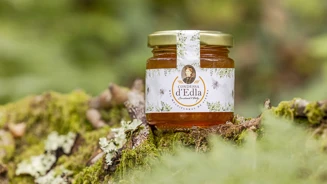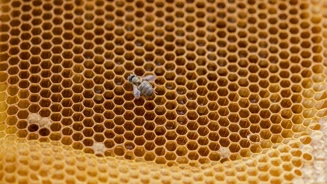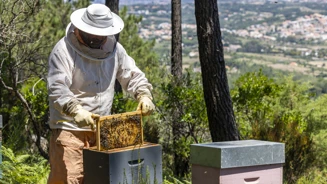Countess of Edla honey

In 1877, King Ferdinand II made a request to the treasurer of the royal house of the Park of Pena, instructing that beehives be installed inside the park next to the Countess's Garden. The two letters from the treasurer, dated 11th and 24th November of that year, also stated that the Countess of Edla would define the final location for the hives.
147 years on, Parques de Sintra has restored the production of honey harvested exclusively in the Sintra hills and is launching Countess of Edla Honey on Friday 6 December 2024.
Beehives have an ancient presence in the Sintra hills, reflecting the many years of beekeeping in the region. The project to revive this ancient tradition began in June 2023 with the installation of 11 apiaries, spread across various ecologically and historically important sites. The locations chosen were the Ferdinand II’s hunting grounds, the Saldanha hunting grounds, the Monserrate hunting grounds, and the Forest Perimeter of the Sintra hills, totalling 165 hives.
Honey production is an ancient activity that involves a series of stages that must be carefully followed to guarantee the quality and purity of the final product. In Parques de Sintra's beekeeping project, this practice is carried out with deep respect for tradition and in accordance with best sustainability and nature conservation practices. The honey produced in these forested areas also promotes short production chains and a circular economy.

The importance of bees to the ecosystem
Beekeeping plays a crucial role in maintaining natural ecosystems and promoting biodiversity. Of all the insects, wild and honey bees are the most important pollinators, contributing to the pollination of agricultural crops. But the contribution of bees goes beyond agriculture, as bees also pollinate a wide variety of wild plants on which the health of natural or semi-natural habitats depends.
In recent years, bees have been facing a sharp decline in various parts of the world as a result of a combination of factors, such as the use of pesticides, habitat loss, climate change and the presence of pests and diseases (such as the Varroa destructor mite).
In Portugal, data points to an annual hive mortality rate of between 20 and 30%. The recent arrival of the Asian hornet in Portugal has also negatively affected bee survival. Encouraging sustainable beekeeping is therefore an important contribution to conserving bee populations and maintaining healthy ecosystems.

The Parques de Sintra beekeeping project
Parques de Sintra's beekeeping project is based on sustainable beekeeping principles such as handling hives in a way that guarantees the health and productivity of the bees, preserving existing habitats in forested areas, and minimising the use of pesticides and herbicides in areas near the hives.
The main environmental benefits of this project are the promotion of biodiversity (pollination promotes the reproduction of plant species which, in turn, provide food and shelter for various species of fauna) and the improvement of water quality (many plants pollinated by bees develop more robust root systems, which help prevent erosion and reduce surface run-off).
The main objectives of Parques de Sintra's beekeeping project are:
- to preserve and publicise a traditional activity of high ecological and economic value,
- to promote the pollination of plants, especially native botanical species, thus helping improve their genetic diversity and ability to resist disease and climatic stress.
With this project, Parques de Sintra also endeavours to:
- promote biodiversity through the presence of healthy bee colonies that contribute to the conservation of ecosystems and local flora,
- promote the circular economy by producing food close to the end consumer, using modern techniques to promote sustainable production.
